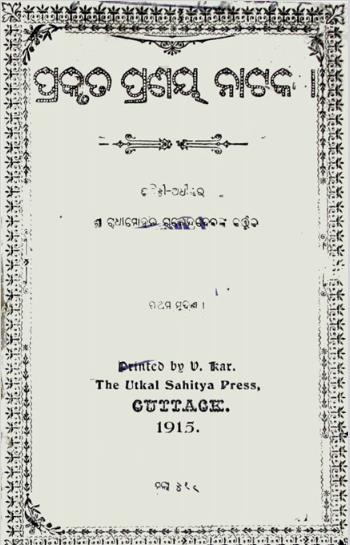First published in 1915, Prakruta Pranaya Nataka stands as a seminal work in Odia literature, showcasing the brilliance of playwright Radha Mohana Rajendra Deba. This drama not only reflects the cultural and social dynamics of its time but also marks a significant contribution to the blossoming landscape of Odia theatre. With its engaging narrative and rich characterizations, Prakruta Pranaya Nataka captivates audiences while exploring timeless themes of love, nature, and human relationships.
The early 20th century was a period of cultural renaissance in India, particularly in the realm of language and literature. As the country moved toward independence, there was a burgeoning interest in regional arts and the revival of indigenous narratives. In Odisha, this movement found expression through various literary forms, including drama. Prakruta Pranaya Nataka emerged as a response to the socio-political milieu of the time, reflecting the aspirations and struggles of the Odia people.
The title Prakruta Pranaya, which translates to Natural Love, underscores the play’s exploration of love’s intrinsic connection to nature and the environment. This theme resonates deeply with audiences, as it reflects a longing for authenticity in human relationships amidst a rapidly changing world.
At its heart, Prakruta Pranaya Nataka delves into the intricacies of love—romantic, familial, and platonic—set against the backdrop of nature’s beauty. The play weaves a narrative that emphasizes the harmony between human emotions and the natural world. Through vivid descriptions and dynamic dialogues, Rajendra Deba brings to life the landscapes that mirror the characters’ inner struggles and joys.
The characters in the play are meticulously crafted, each representing different facets of love and desire. Their interactions are not only poignant but also reflect broader societal values and conflicts. For instance, the interplay between tradition and modernity, the tension between personal desires and societal expectations, and the connection of characters to their cultural heritage are all explored with nuance and depth.
Rajendra Deba’s writing is marked by its lyrical quality and rhythmic dialogue, traditional to Odia theatre. The use of local idioms and culturally rich references adds authenticity to the characters and their experiences, creating a relatable and immersive atmosphere for the audience. The play’s structure effectively balances narrative and dramatic elements, allowing for moments of introspection alongside engaging dialogue.
Additionally, the integration of music and dance, hallmarks of Odia theatre, enhances the emotional impact of the narrative. These elements not only enrich the storytelling but also celebrate the cultural vibrancy of Odisha, making Prakruta Pranaya Nataka a multi-sensory experience.
Prakruta Pranaya Nataka has left an indelible mark on Odia drama, inspiring subsequent generations of playwrights and theatre practitioners. Rajendra Deba’s ability to intertwine love and nature resonates with audiences, inviting them to reflect on their own relationships with both people and the environment. The play has been instrumental in shaping discussions around love, identity, and cultural heritage in Odia literature.
Books Info
| Books name | Prakruta Pranaya Nataka/ପ୍ରକୃତ ପ୍ରଣୟ ନାଟକ |
| Author | Radha Mohana Rajendra Deba |
| No Of pages | 242 |
| Publisher | NA |
| Publication | 1915 |
| Printed At | The Utkal Sahitya Press |
| Distributor | NA |

